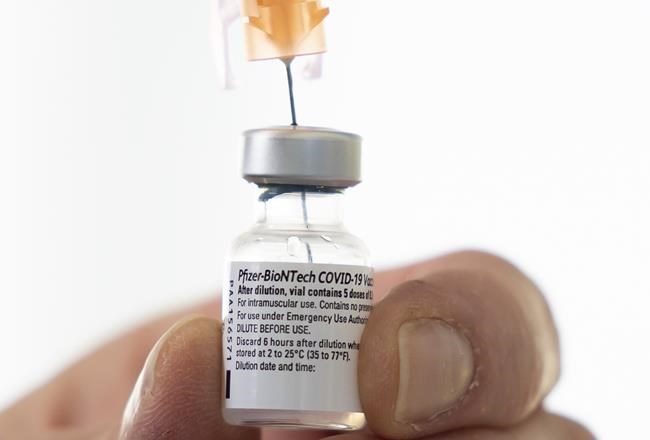B.C.’s ramped-up vaccination program has created a lot of hope and optimism, and the government is keen to support that mood, despite news Wednesday that raises concern about supplies.
The European Union has introduced emergency legislation for an export ban on vaccines and there was a report that India, where millions of doses are manufactured, is also curbing exports.
Various European countries have been complaining bitterly that AstraZeneca has been shorting them on promised doses. That culminated in the EU move, still to be ratified, to restrict overseas shipments until all their citizens get shots. And Reuters, quoting unnamed sources, reported that India has curbed distribution plans at that firm’s large local operation to ensure its citizens get more doses.
Obtaining vaccine supplies in Canada is the responsibility of the federal government and those officials have reassured B.C. leaders an export ban won’t affect supplies. The province has administered 582,634 doses as of Wednesday.
Premier John Horgan and Dr. Penny Ballem, in charge of the vaccine rollout, accepted those reassurances Wednesday.
It may be because they have no choice.
Horgan said: “I guess this is just another day at the office, quite frankly. We are at the hands of international suppliers.” He said B.C. has been assured by the Prime Minister’s Office it’s “full steam ahead.”
Horgan said B.C. is using its supply strategically and is planning a concentrated effort in the Fraser Health region — as it did in Prince Rupert — in the days ahead. That region is where the vast majority of cases have developed.
When the vaccines were first developed, Canada got off to a promising start, approving the first one ahead of the U.S. But production issues led to curtailed shipments through January and February. At one point, supply dried up completely.
That led to mounting concern, before large shipments started arriving again in mid-February.
When the supply to B.C. firmed up, officials rushed loads of AstraZeneca to Prince Rupert and vaccinated virtually the entire city. On Wednesday, Horgan remarked on the immense relief and “euphoria” that created amongst residents.
He said he wanted to reinforce that “there is extremely good news on the horizon in the weeks ahead.”
The steady process of the vaccination program has also helped counter the alarm over the surge in the case count over recent weeks. On Wednesday, another 716 cases were reported in B.C., which makes for 5,573 active cases.
Canada has ordered many times more doses than are needed to create backstops and contingency plans. But ordering them and receiving them are two different things.
Ballem, a former deputy health minister, said the Prime Minister’s Office had contacted the EU and was told “our supplier – Moderna – won’t be impacted by the ban.”
She said her experience to date with the PMO is that they “are very clear with us when they can reassure us, when they’re not sure, they’re quite clear about that.”
“So I feel quite comfortable that that supply, which is vital … is assured at this point and will be continuing.”
Ballem said the U.S. has committed 1.5 million doses to Canada, of which 136,000 are slated to arrive in B.C.
Horgan credited the immunization program’s nimbleness and adaptability, which “allows us to deal with the uncertainty we’re all facing.”
Both Ballem and Horgan maintained the stance that has prevailed since the beginning: Criticism of Ottawa is off-limits, and a waste of time.
“It does us no purpose, no purpose whatsoever, to lament what could be,” Horgan said.
Ballem said the federal government has done a huge amount of work to procure vaccines, although she noted it stems from the fact we don’t have any internal vaccine production capacity.
Just So You Know: Further to concerns about Alaska’s plan to lobby the U.S. Congress to change the law to allow cruise ships to sail past Victoria without stopping, Horgan said his government is much more engaged than Tourism Minister Melanie Mark appeared Tuesday. He said they’ve talked to the federal government and the U. S. ambassador. Horgan said he’s “disappointed” at Alaska’s move, but confident it has only a remote chance of passing.
Mark had earlier side-stepped the question and said the government was focused on immunization.
Horgan said the issue is just a “blip” arising from frustration.



